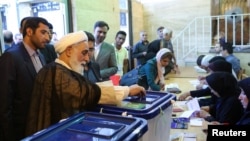Iran reacted skeptically Tuesday to President Donald Trump saying that he's willing to negotiate with his Iranian counterpart "anytime," but top officials did not reject a sit-down out of hand.
Ali Akbar Nategh Nouri, a senior cleric and member of the influential Expediency Council, said Trump's suggestion Monday that he would be willing to meet with Iranian President Hassan Rouhani should not be categorically rejected.
"It should be discussed in the Supreme National Security Council," said Nategh Nouri, who is also a former aide to Supreme Leader Ayatollah Ali Khamenei. Nategh Nouri said "we have to contemplate" the gesture, but also cautioned ``we should not rejoice over this offer and not get excited."
"Trump may take advantage of this over-excitement,'' he said, the state-run IRNA news agency reported. "It could be a test for us."
Trump pulled the U.S. out of a deal with several major powers and Iran earlier this year that was meant to prevent Tehran from developing nuclear weapons. He's also said, however, that as renewed sanctions kick in, he expected Iran would call and offer to return to the negotiating table, and that "we're ready to make a real deal."
On Monday he said he could meet with the Iranians with "no preconditions," adding that "if they want to meet, I'll meet anytime they want."
Former President Barack Obama held a brief phone call with Rouhani in 2013, as the talks that led up to the nuclear deal were getting underway. It was the first time the presidents of the two countries had spoken since the 1979 Islamic Revolution and the storming of the U.S. Embassy, which led to the severing of diplomatic ties.
In his first public comments after the remarks, Rouhani himself avoided mentioning Trump's comments, instead stressing the need for the other nations involved in the nuclear deal to forge ahead with their pledges of trying to salvage it.
"Today we are at a very critical point in history regarding the nuclear deal, and Europe's transparent measures to compensate for the United States' unlawful withdrawal from it are very important for the Iranian nation," Rouhani said after talks with new British Ambassador Rob Macaire.
Britain, along with China, Germany, France, Russia and the European Union, are negotiating with Iran on preserving the deal.
The Iranian leadership has previously ruled out one-on-one talks with Trump, following his decision to pull the United States out of the deal under which Iran was given relief from sanctions in return for curbs on its nuclear program.
Iran's semi-official ISNA news agency quoted Rouhani's political adviser Hamid Aboutalebi as saying that for talks to happen, the U.S. needs to rejoin the deal.
"Those who believe in dialogue as a method of resolving disputes in civilized societies should be committed to the means," he said.
Trump withdrew from the landmark nuclear accord in May, saying it was too generous to Iran. He has vowed to ramp up sanctions until Iran radically changes its policies, including its support for the Syrian government and regional militant groups, something the country's leaders have long refused to do.
Even though Trump said there would be "no preconditions" to talks with Rouhani, he also did not walk back from any of those earlier demands.
With the first U.S. sanctions due to come into effect next Monday, the economy in Iran has already been hit, giving rise to growing fears of prolonged economic suffering. Another round, covering other types of commerce, including oil purchases, goes into effect Nov. 4.
Rouhani on Tuesday again suggested Iran could cause major disruptions in the Gulf region by attempting to block key shipping lanes, saying "Iran has never sought tensions in the region and does not want there to be any problem for the world's waterways, but it will never let go of its right to export oil," the semi-official Mehr news agency reported.
With the U.S. sanctions looming, the Iranian currency has been in freefall, hitting a new low Monday, at 122,000 to the dollar on the thriving black market. It recovered slightly to 115,000 on Tuesday, but concerns are growing as Iranians have seen their savings dwindle and purchasing power drop.
Heshmatollah Falahatpisheh, who heads the parliamentary committee on national security and foreign policy, suggested a U.S. return to the nuclear deal would be needed before Tehran could think of negotiating.
"There can be no negotiations with the Americans raising the issue of talks from the position of power," he was quoted as saying on the website of the Iranian parliament, calling Trump's decision to pull out of the nuclear deal the "biggest blow to diplomacy."
Reformist lawmaker Mostafa Kavakebian questioned negotiating with Trump, calling him "untrustworthy," and also said now was not the time for talks.
"If this negotiation (is) carried out in any form, then it will be considered as surrender, and the Iranian nation will not surrender," he said.
Iran Wary of Trump Offer for Talks, But Not Ruling Them Out
update

TEHRAN —



